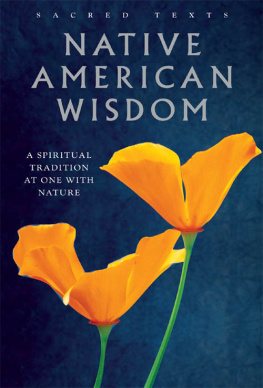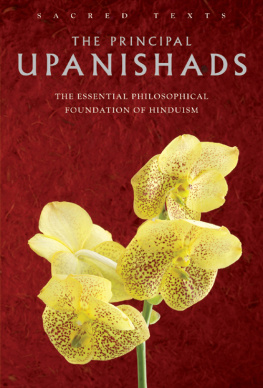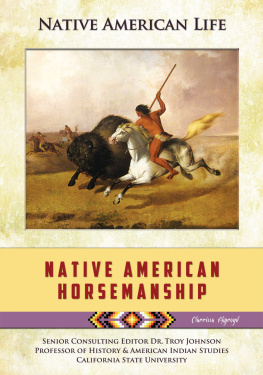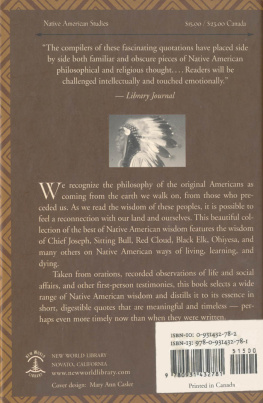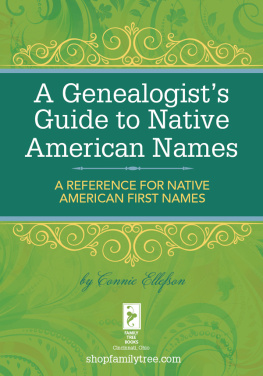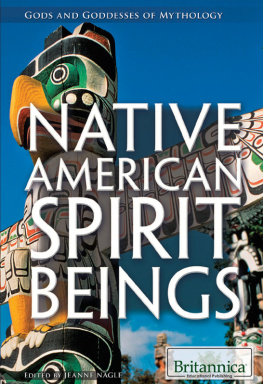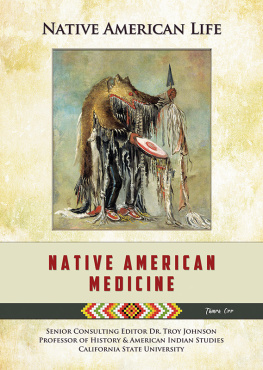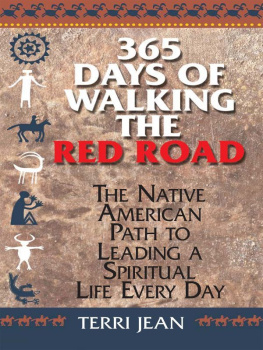Alan Jacobs - Native American Wisdom: A Spiritual Tradition at One with Nature
Here you can read online Alan Jacobs - Native American Wisdom: A Spiritual Tradition at One with Nature full text of the book (entire story) in english for free. Download pdf and epub, get meaning, cover and reviews about this ebook. year: 2012, publisher: Watkins Media, genre: Religion. Description of the work, (preface) as well as reviews are available. Best literature library LitArk.com created for fans of good reading and offers a wide selection of genres:
Romance novel
Science fiction
Adventure
Detective
Science
History
Home and family
Prose
Art
Politics
Computer
Non-fiction
Religion
Business
Children
Humor
Choose a favorite category and find really read worthwhile books. Enjoy immersion in the world of imagination, feel the emotions of the characters or learn something new for yourself, make an fascinating discovery.
- Book:Native American Wisdom: A Spiritual Tradition at One with Nature
- Author:
- Publisher:Watkins Media
- Genre:
- Year:2012
- Rating:5 / 5
- Favourites:Add to favourites
- Your mark:
- 100
- 1
- 2
- 3
- 4
- 5
Native American Wisdom: A Spiritual Tradition at One with Nature: summary, description and annotation
We offer to read an annotation, description, summary or preface (depends on what the author of the book "Native American Wisdom: A Spiritual Tradition at One with Nature" wrote himself). If you haven't found the necessary information about the book — write in the comments, we will try to find it.
Native American Wisdom: A Spiritual Tradition at One with Nature — read online for free the complete book (whole text) full work
Below is the text of the book, divided by pages. System saving the place of the last page read, allows you to conveniently read the book "Native American Wisdom: A Spiritual Tradition at One with Nature" online for free, without having to search again every time where you left off. Put a bookmark, and you can go to the page where you finished reading at any time.
Font size:
Interval:
Bookmark:

AMERICAN
WISDOM
 A Spiritual Tradition At One With Nature Edited by Alan Jacobs
A Spiritual Tradition At One With Nature Edited by Alan JacobsIntroduction by Dr Mick Gidley

The religion of the Native Americans includes prayer, ceremony, Sun Gods, Star Gods, Sky Beings and Ethereal Spirits a veritable Celestial Sky held on high by a magnificent World Tree. They revere the brave Culture Heroes who deliver victory, institutions, rituals, guidance and inspiration to their fellow human beings. Women hold a high place in their divinatory structure and are respected for their love, motherhood, courage and wisdom. Dance, chant, music and elaborate decorative motifs (in their colourful carved wooden totem poles and woven rugs and shawls) play an important part in their rituals. If we could enter the hearts and minds of Native Americans, before they were threatened by avaricious white settlers, we would see that they felt a great spirit world above them, wherever they went. The Earth was their mystic temple.
Below the blue celestial sky, all their activities were a form of Nature worship. Glimpses of bright spirits flashed in the sunlight; they hovered, sending their messages to the brave and noble. The Supreme Being sets the rainbow in the clouds, which in due season water the land. The wisdom of the Native Americans is profoundly holistic: an all-embracing pantheism pervades every aspect of their richly textured lives, which reflect their sound ecological and environmental beliefs. Their message has an important relevance at this time, when our planet is threatened by cataclysmic change brought about by mans greed and heedlessness. In compiling this anthology I have come to love the soul of the Native American Indian.
It is my earnest hope that this collection will enthuse and inspire all those who delve into the magic of its pages. Alan Jacobs
Whether in the more arid environment of Oklahoma or among the hills of the Carolinas, they have struggled to survive as communities of farmers and by hunting for small game. The Kwakiutls, long-time inhabitants of villages along the coast of British Columbia at the northern end of Vancouver Island, look to the sea for their livelihood and to the surrounding rain forest for huge planks of timber for their homes. The Cheyennes, in their two branches, were traditionally nomadic peoples who camped in hide tipis as they hunted buffalo over a huge tract of the Great Plains; after their valiant resistance to white encroachment onto their lands during the last half of the nineteenth century, they were consigned to reservations in Montana and Oklahoma and constrained to small-scale farming and ranching. These peoples, like many others who feature in Native American Wisdom (from which almost all the quotations in this Introduction are taken), are as disparate as the peoples of Europe, or more so. From the vantage of today, it is all too easy to forget that when Columbus arrived in the New World all of it was populated by an extraordinary array of peoples whose cultures had been created and were continuing to evolve in interaction with the specific geographies and climates, and with the other native cultures around them. Fully a third of the planets root languages were spoken in the Americas, many of them deploying syntactical structures, sounds and meanings unique unto themselves.
The scale of destruction in the hemisphere since has been catastrophic: vast areas of land have been totally denuded of their indigenous populations; entire nations, cultures and languages have been expunged, sometimes with barely a record of them ever having existed; and in the whole of the Americas there is now no nation state in which an indigenous people or language is dominant. Yet, despite the sheer scale of this devastation and, importantly, despite the continuing frequent denigration of first nation peoples and their way of life many indigenous languages do survive and, even where they are endangered now, a heritage of stories, sayings, songs, incantations and mythology has persisted. In North America, as the present volume testifies, new poems, tales, speeches and maxims have been and are being composed in English. Despite the diversity among these peoples, a cardinal belief markedly held in common by all of them is reverence for the land. Jimme Derham, the present-day Cherokee artist and activist, has written: in the languages of my people there is a word for land: eloheh. This same word also means history, culture and religion.
We cannot separate our place on Earth from our lives on the earth nor our vision nor our meaning as a people. Towards the end of the nineteenth century, Ten Bears, the great Comanche chief, in his old age expressed his pride that he had been born upon the prairie where there was nothing to break the light of the sun, and that he knew every stream and every wood between the Rio Grande and the Arkansas rivers. And the Iroquois have a prayer, printed in full in this anthology, in which speakers return thanks to our mother, the earth, and then to the rivers and streams, to all herbs, to the corn, and to her sisters, the beans and squashes, and on through many of the other elements of the natural world. Everything is alive: not just the animal kingdom, but insects, trees and shrubs, the invisible wind, dust and stones. Not surprisingly this veneration of the earth which we can now see as in tune with modern ecological thought is not only evident in the content of Indian verbal expressions, it is also part of their form. We can hardly help noticing that stories, songs and, especially, speeches brim with natural metaphors.
Ohiyesa, a Sioux who was educated to become Charles A. Eastman, a medical doctor, author and an advocate of Indian interest at the turn of the twentieth century, remembered his uncle telling him that he ought to follow the example of the
Font size:
Interval:
Bookmark:
Similar books «Native American Wisdom: A Spiritual Tradition at One with Nature»
Look at similar books to Native American Wisdom: A Spiritual Tradition at One with Nature. We have selected literature similar in name and meaning in the hope of providing readers with more options to find new, interesting, not yet read works.
Discussion, reviews of the book Native American Wisdom: A Spiritual Tradition at One with Nature and just readers' own opinions. Leave your comments, write what you think about the work, its meaning or the main characters. Specify what exactly you liked and what you didn't like, and why you think so.

